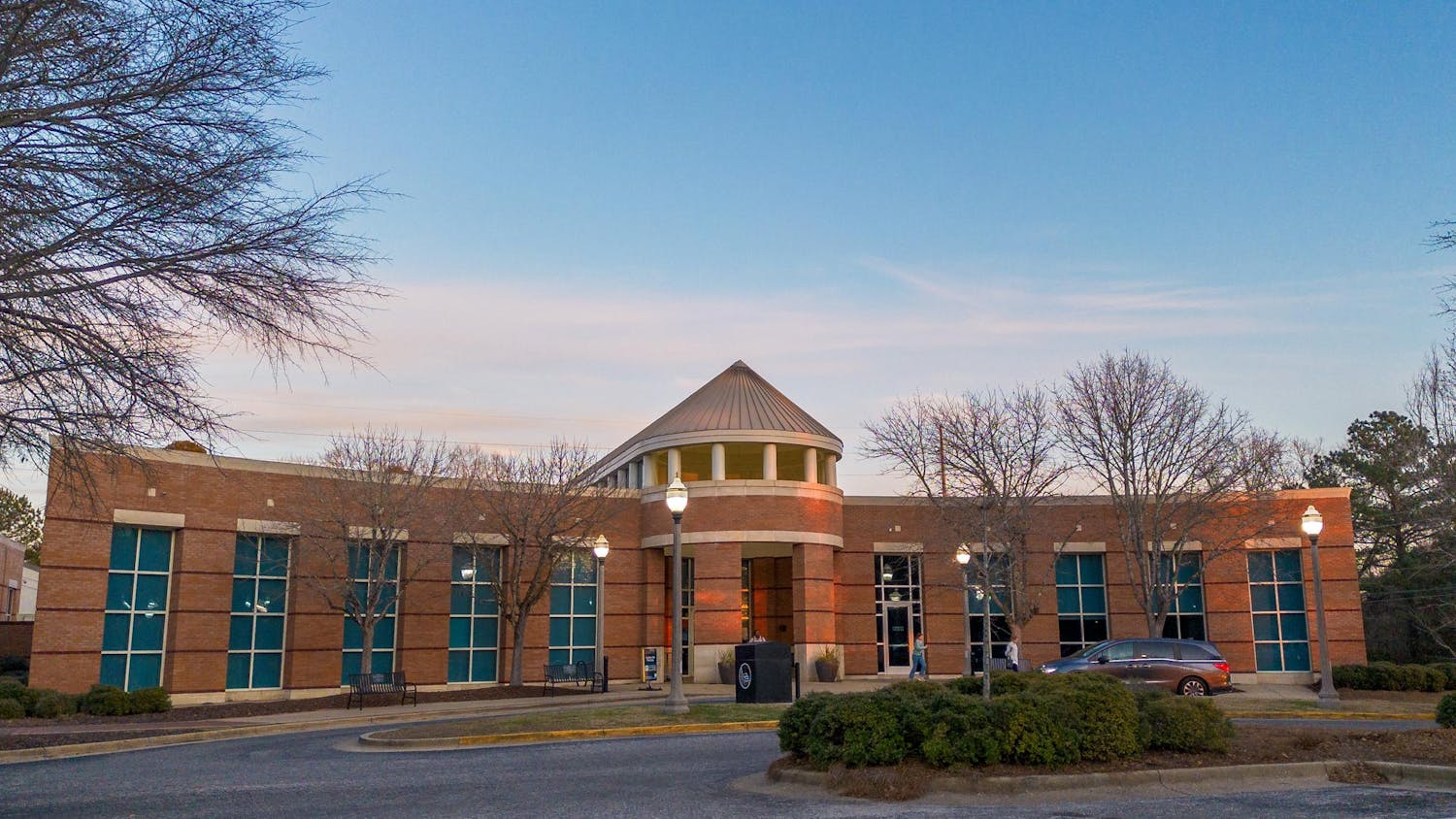Zacarías loves pineapple Jarritos. He’s a husband, a forward for his two-and-five soccer team, a construction worker, a tan-complexioned, boot-wearing, ramen-for-dinner kind of man.
“But above all,” he pauses and points with his chin at the little girl and boy. “I’m a dad, a dad for these beautiful, smart, amazing — ” Zacarías said before getting cut off by his daughter.
“Papi,” she exclaims. “That’s a lot of things.”
This is Zacarías — a father. But in the evening, after he’s tucked in his kids and kissed his wife goodnight, he sits in bed and prays and remembers what else he is.
With clenched fists, he begs God that this night not be his last. He prays and prays for a tomorrow, for another cool, serene evening with his family. He wants nightfall to come endlessly, he said, to flow like a river and drown his worries of being taken. Zacarías prays for this because of what else he is — an immigrant.
But before helming that label, before Auburn and kids and life, Zacarías’ story began as a little boy abandoned by his father and left at his grandfather’s coffee farm in Guatemala.
He remembers “the first day of hell” perfectly. It was the early '90s when grandpa gave 5-year-old Zacarías a machete.
“You’re old enough now,” his grandfather said to him. “Go on and get to work.”
Little Zacarías grabbed the machete and with all his scrawny, malnourished strength, hacked away at the coffee plants.
“My grandfather worked with the sun,” Zacarías says. “When it rose, we worked. When it fell, we went home. That’s how it was.”
Sometimes, when dusk turned the sky a murky purple, Zacarías and his cousins gathered plastic bags and jumbled them into a soccer ball. They’d kick the airy thing until the last light fled. Other times, they’d make toys from coffee plant leaves. Their grandfather would catch them and whip them with his belt, lashing them not with hatred, but fear, Zacarías says. A fear that his boys would not work, that no matter how hard he tried, his family would lay down on the dirt in their disheveled shack and sleep to the tune of their small stomachs growling. And so, he lashed them.
Zacarías’ impoverished life, however, is rooted in a Civil War that devastated their country.
In 1954, the democratically elected President Jacob Arbenz was toppled by a CIA-backed coup because he was viewed as bringing “communist policies,” such as land reform that would redistribute large estates to peasants like Zacarías family. A war then ensued. This led Rios Montt, a charismatic evangelical preacher, to emerge as dictator in March 1982. His uprising led to a leftist uprising and a bloody Civil War.
United States President Ronald Reagan was a fan of Montt, so in 1983, his administration lifted the embargo on the sales of weapons to Guatemala just as Montt’s government “led a campaign to wipe out large portions of the country’s indigenous populations,” as stated in a United Nations report. According to another report by a United Nations-backed Truth Commission, Montt’s government was responsible for “90 percent of deaths, disappearances and other human rights violations during the war,” and the U.S. played “a significant bearing on human right violations” during it.
The aftermath left Guatemala in shambles, and it forced Zacarías to trade in a pencil for a machete. And as he grew and the coffee plants grew and their disparity grew, all he wanted was education.
“I wanted to go to school so bad, but those coffee fields dragged me down,” Zacarías says. “I also grew so tired of getting home and there being nothing to eat, but I realized something then. I realized that our story is one of struggle.”
It was a struggle that suffocated him in the fields when the sun beamed mercilessly. A struggle that made him hallucinate for ceiba trees. A struggle that granted him one ice cube with a single drop of juice, only after three weeks of pinching together 8 cents.
“All of this made me think, ‘I have to go to the United States and leave this hunger and misery,’” Zacarías recalls. “‘I’d rather die trying to cross the Río Bravo than stay here.’”
At age 13, Zacarías packed his sack and left. His family’s goodbyes felt like those given at a funeral, he says.
He trekked across Mexico for three weeks in buses and on foot. Finally, he made it to a small town in Sonora. The place was controlled by drug dealers, and they’d torture those who refused to pay when asked. Most times, people did because on the other side was their destination — Arizona. The guide responsible for taking them gathered everyone together.
“Buy water for five days. We leave at night,” Zacarías remembers the guide telling the group.
All Zacarías could do was look out to the barren desert and pray. With the first batch of peeking stars, they picked up their bags and ran, knowing full well the likelihood of detection and — if their prayers and saints failed them — death.
They tossed their bags over fences and burrowed underneath as quickly as possible. “Más rápido,” the guide whispered. Faster, faster. Immigration officers were seen at a distance, shining their flashlights. Zacarías’ group dived down. The ground was covered with cacti. They crawled through the thorns, covering their bodies with tiny streaks of blood. Anyone who yelped from the pain was immediately hushed.
“Gritas, te mato,” the guide said.
Yell, I’ll kill you.
They ran and crawled and bled all through the night. The desert was so vast, so dark, Zacarías remembers, it felt like being lost in space. Then, the guide stopped. Zacarías tried catching his breath but noticed a strange odor.
“I glanced around me, and suddenly, I saw what I was smelling,” Zacarías says. “There were dead bodies everywhere. … I’m not sure how many. It was around 9 p.m., though, and I couldn’t see good, but I think it was five. Yes, around five, but I tried not to stare at them.”
The group continued moving. Their guide told them, “Stay close, all bunched together.” People who strayed away had been known to be attacked by coyotes, he said. Zacarías put his head down and focused on the ground. Maybe this way he wouldn’t see more dead people that looked like him.
“That’s when I thought, ‘Lord, please help me. I don’t want to go back; I don’t want to return to that life,’” Zacarías recalls.
How much must one suffer to get here, he wondered. There are people, like those whose bodies now lie in the desert, rotting, that leave their country not with deviousness or for pleasure, but because of necessity, he says — a necessity to feed kids, to care for grandmothers and to put pencils, rather than machetes, in the tiny hands of children. And now these people stench the desert with their death, and I can smell them, he thought.
“I just wanted a better life. I didn’t want to die like them,” Zacarías says, looking straight at his daughter, who looks right back.
Zacarías’ group continued its journey through the desert, the moonlight outlining each ripped shirt, each battered and bloodied body. They walked and walked for three nights and three days, plucking their skin with thorns, staining their memories with lifeless migrants.
“We walked for such a long time until, finally, we saw three white trucks on a dirt road,” Zacarías says.
The men driving the trucks had been hired to transport the migrants to a haven in Tucson, Arizona, where they would get situated to board the bus of their choosing. One by one, the men tied up Zacarías’ group by the hands as they placed them in the back of the pickup. No one made any fuss of being tied. They were too weary and dehydrated to care. “Thank you, God,” Zacarías thought to himself. “I made it.”
People were crammed on top of Zacarías. In the bumpy, three-hour ride, Zacarías gasped through dusty, sweat-smelling pockets of air. But he didn’t mind. The journey felt like it was over.
The truck suddenly came to a halt. They were here.
“Everyone stay where you are,” the men driving the truck ordered.
Zacarías felt himself get dragged to the floor. He managed to see the name of the apartment complex and room number as he looked up.
“What the hell is the matter with you?” Zacarías asked the men.
“You shut the hell up, or we’ll toss you back to el desierto,” one of the men barked.
Zacarías saw the guns tucked inside each mans’ jeans and realized what was going on. They looked nervous and high and ready to kill if need be, he said.
“Once I saw that, I knew we had just been kidnapped,” Zacarías said.
They took Zacarías and the rest of the group inside the apartment. Inside, Zacarías saw bags of drugs scattered throughout and other hostages that looked like they had not eaten in weeks, he said. They sat them against the wall.
“Listen up, each of you are going to pay us $4,000. Only then, will we take you to the buses,” Zacarías remembers the men saying to his group.
Someone told the men they had no way of getting that money, something Zacarías was too afraid to voice.
“Well then, we have two options,” the man said. “We toss you back in the desert, or we cut off one of your fingers and mail it to your family back home. Those are your choices.”
One by one, they approached each person and asked who to contact to get money. It came time for Zacarías to answer.
“I told them I had no money, and no way of getting money,” Zacarías said. “They just said to me, ‘Well, we’ll have to make you think harder.’”
As Zacarías readjusts in his couch to continue, his daughter turns off the television and stares at her father intently as if a ghost were in front of her.
“Y qué te pasó?” she asks.
What happened to you?
They brought him to the bathroom. He noticed the bathtub was filled and braced himself. A damning thought came to his head, he said.
“I may not have drowned in the Río Bravo,” Zacarías recalls. “But I will drown in this tub.”
They submerged him, and as his lungs struggled, he realized another peculiar thing. He was finally in America.
This piece is part of a series. The second part of the series will be published in our next issue on Oct. 18, 2018.
Editor’s Note: We withheld Zacarías last name because of his undocumented status.
Do you like this story? The Plainsman doesn't accept money from tuition or student fees, and we don't charge a subscription fee. But you can donate to support The Plainsman.





